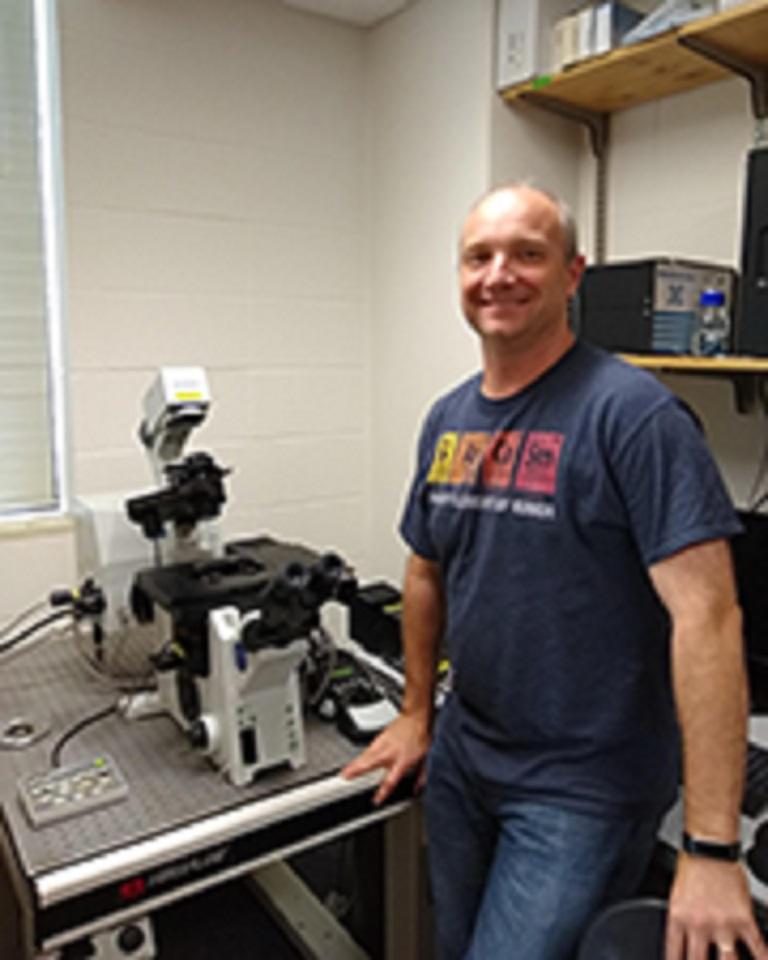Brian Ackley

MENTOR SPOTLIGHT | FEBRUARY 2020
Department: Molecular Biosciences
Describe your research/creative scholarship in a few sentences that we can all understand: We try to understand how neurons (brain cells) develop and change throughout the life of an organism. We also work to understand how genetic mutations that result in neurological disorders impact the nervous system. By understanding them in a simple organism, we hope to make insights into why they impact some people more than others, and work to find potential therapeutics for these diseases.
Q: How did you first get interested in doing research or creative work?
A: In college, I was reading a textbook and it described synapses, the tiny subcellular structures that connect neurons to their targets. I began trying to understand how these structures were formed and changed in individuals, a task I’m still trying to accomplish.
Q: What do students in your discipline learn by doing research that they wouldn’t learn by just taking classes?
A: Just how complicated it is to create knowledge. So much of what we do is confirming or refuting things that might seem simple. The things we do in scientific research labs will end up in textbooks years from now. I hope that after participating in laboratory research, when students are reading their textbooks, that they better understand the work, the care, the consideration that went into first discovering, then confirming the facts that students later learn about.
Q: What do you find to be the most exciting part of doing research or creative work? What makes this line of work meaningful and interesting to you?
A: Similar to the above. There are times where, during a process of discovery, you might learn something that no one else in the world knows. That’s a thrilling moment. Then you get to communicate it to the world (and hope they share your excitement).
Q: What advice do you have for undergraduates interested in doing research in your field?
A: It’s okay to be ignorant about what goes on in a research lab and in science. We want students who are eager to learn, and that includes not knowing what you’re doing at the beginning. Then ask questions. Asking questions makes everyone around you think about what they are doing, and sometimes real breakthroughs come from questions experienced people did not think to ask.
Q: For many students, doing research or a larger creative project is the first time they have done work that routinely involves setbacks and the need to troubleshoot problems. Can you tell us about a time that your research didn’t go as expected? Or about any tricks or habits that you’ve developed to help you stay resilient in the face of obstacles?
A: Great question. I have so many examples in my own experience. Once, while making media for our organisms (C. elegans, nematode worms) I grabbed the wrong chemical, sodium citrate, instead of sodium chloride. The plates I made to grow them were so hygroscopic the worms desiccated as soon as I put them on the media. When students in the lab hit setbacks or problems, I will tell them we call it (Re)search because we do it again and again. Mentors need to communicate that science involves a lot of failure, sometimes for reasons that are informative and sometimes for reasons that are trivial. I will usually tell students to repeat a failed experiment, and if that fails again we’ll troubleshoot it together. Usually, we hope that we can learn from our failures, a process I usually call “failing successfully.” I will often also suggest they do something that has worked recently. Just getting a positive or expected result can restore confidence.
Q: How do you spend your time outside of work?
A: In my spare time, I enjoy reading books and playing sports; I play in the Lawrence Adult Soccer League, which helps remind me that I’m not in my 20s anymore. I love just hanging out with my wife and two kids, enjoying a good meal and watching a movie or playing a game at home. I also enjoy stretching my intellectual muscles by participating in local trivia contests.